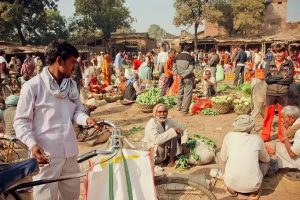FPOs for Financial Inclusion

Photo by Radiokukka on iStock
In a country with roughly 150 million of its population working as farmers, 88% among these are small and marginal farmers. It implies that their average landholding is less than 2 hectares. This makes it difficult to produce enough to sell or add value, and even more difficult for the individual farmer to have any kind of bargaining power in the market.
The concept of a Farmer Producer Organisation (FPO) wherein every farmer member is a shareholder in the organisation may be considered as an effective means. It reduces the risk in agriculture while improving the access of small and marginal farmers to investments, technology and markets. FPOs can be formed under the aegis of a cooperative, trust, federation or even a company; National Bank for Agriculture and Rural Development (NABARD) has been one of the prime promoters of the FPOs. Today ~ 7000 FPOs exist across the country supporting on an average 600 farmers per FPO and the number is rising steeply. It does not require an understanding beyond the famous childhood fable called ‘the bundle of sticks’ to understand the benefits that an FPO can provide to its individual farmer. However, to reap out the complete benefits, an FPO will have to command the loyalty of every farmer. How can this be achieved? Let’s understand some of the ground realities of our small and marginalised farmers through an example.
Take the example of an FPO ‘X’ dealing with fresh vegetable aggregation and sales. 100 % of its sales happen as B2G (business to government) through award of tenders. A typical delay in payment by three months (revenue for the FPO) is quite ‘normal’. The individual farmer who sells his produce on a daily basis is at financial risk here. In another scenario, the FPO management might be so involved in the day-to-day operations that the financial welfare of individual farmers might just be out of reach. All this can make an individual farmer lose his trust on the FPO.
Formal institutional credit still remains out of bounds for the small and marginal farmers due to their inability to produce a financial history or give a collateral. FPOs can be a vehicle for financial inclusion of these underserved communities of small and marginal farmers, including women. However, to strengthen these farmer producer organisations and them potent, a deeper understanding is needed about two important aspects viz., the situation of financial literacy among the members of FPOs and the access to formal credit to ease out the daily operations. The primary theme here is to understand the means to mitigate financial risks associated with the underserved communities by being a part of the FPOs. Having spoken to a few FPOs, the authors have come to an understanding that almost 90 % members of FPO have a formal bank account however, they do not usually transact digitally. Also, they fail to understand the basic concepts of invoicing and bills. If the FPOs focus more on the financial care of their farmer members (apart from the usual benefits of being an FPO member), then there is a possibility of improving the farmer’s loyalty towards the FPOs.
Thus, it would be an interesting proposition to delve into the multi-facets of an FPO; and how it can function as a potential vehicle for financial inclusion of the underserved farming community.
This research was developed as part of the Bharat Inclusion Research Fellowship.
